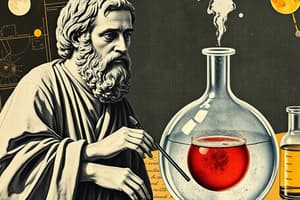Podcast
Questions and Answers
Who was Democritus?
Who was Democritus?
A Greek philosopher
What was Democritus's contribution to atomic theory (What is 'Atomos')?
What was Democritus's contribution to atomic theory (What is 'Atomos')?
He proposed that matter, when small enough, reaches a point where it can no longer be divided and becomes atoms, meaning 'indivisible.'
When did Democritus come up with his theory?
When did Democritus come up with his theory?
Around 440 BC
When and where was John Dalton born?
When and where was John Dalton born?
What was John Dalton's contribution to atomic theory?
What was John Dalton's contribution to atomic theory?
When did John Dalton make his discovery?
When did John Dalton make his discovery?
What experiments led John Dalton to his discovery?
What experiments led John Dalton to his discovery?
How did John Dalton's new views differ from the views of past scientists?
How did John Dalton's new views differ from the views of past scientists?
How did John Dalton's atomic structure differ from today's?
How did John Dalton's atomic structure differ from today's?
When and where was J.J. Thomson born?
When and where was J.J. Thomson born?
What was J.J. Thomson's contribution to atomic theory?
What was J.J. Thomson's contribution to atomic theory?
When did J.J. Thomson make his discovery?
When did J.J. Thomson make his discovery?
What experiments led J.J. Thomson to his discovery?
What experiments led J.J. Thomson to his discovery?
How did J.J. Thomson's views differ from previous scientists'?
How did J.J. Thomson's views differ from previous scientists'?
How did J.J. Thomson's atomic structure differ from today's?
How did J.J. Thomson's atomic structure differ from today's?
When and where was Ernest Rutherford born?
When and where was Ernest Rutherford born?
What was Ernest Rutherford's contribution to atomic theory?
What was Ernest Rutherford's contribution to atomic theory?
When did Ernest Rutherford make his discovery?
When did Ernest Rutherford make his discovery?
What experiments led Ernest Rutherford to his discovery?
What experiments led Ernest Rutherford to his discovery?
How did Ernest Rutherford's views differ from previous scientists'?
How did Ernest Rutherford's views differ from previous scientists'?
How did Ernest Rutherford's atomic structure differ from today's?
How did Ernest Rutherford's atomic structure differ from today's?
When and where was Neils Bohr born?
When and where was Neils Bohr born?
What was Neils Bohr's contribution to atomic theory?
What was Neils Bohr's contribution to atomic theory?
When did Neils Bohr make his discovery?
When did Neils Bohr make his discovery?
What experiment led Neils Bohr to his discovery?
What experiment led Neils Bohr to his discovery?
How did Neils Bohr's views differ from previous scientists'?
How did Neils Bohr's views differ from previous scientists'?
How did Neils Bohr's atomic structure differ from today's?
How did Neils Bohr's atomic structure differ from today's?
When and where was James Chadwick born?
When and where was James Chadwick born?
What was James Chadwick's contribution to atomic theory?
What was James Chadwick's contribution to atomic theory?
When did James Chadwick make his discovery?
When did James Chadwick make his discovery?
What experiments led James Chadwick to his discovery?
What experiments led James Chadwick to his discovery?
How did James Chadwick's views differ from previous scientists'?
How did James Chadwick's views differ from previous scientists'?
How did James Chadwick's atomic structure differ from today's?
How did James Chadwick's atomic structure differ from today's?
Flashcards
Democritus
Democritus
Greek philosopher who introduced the term 'Atomos' for indivisible matter.
Atomos
Atomos
The concept of indivisible particles proposed by Democritus.
John Dalton
John Dalton
Scientist who contributed to atomic theory around 1808, focusing on fixed proportions in matter.
Dalton's Atomic Theory
Dalton's Atomic Theory
Signup and view all the flashcards
Electrons
Electrons
Signup and view all the flashcards
J.J. Thomson
J.J. Thomson
Signup and view all the flashcards
Cathode Rays
Cathode Rays
Signup and view all the flashcards
Rutherford's Gold Foil Experiment
Rutherford's Gold Foil Experiment
Signup and view all the flashcards
Ernest Rutherford
Ernest Rutherford
Signup and view all the flashcards
Nucleus
Nucleus
Signup and view all the flashcards
Niels Bohr
Niels Bohr
Signup and view all the flashcards
Bohr Model
Bohr Model
Signup and view all the flashcards
James Chadwick
James Chadwick
Signup and view all the flashcards
Neutrons
Neutrons
Signup and view all the flashcards
Atom Structure
Atom Structure
Signup and view all the flashcards
Fixed Proportions
Fixed Proportions
Signup and view all the flashcards
Alpha Particles
Alpha Particles
Signup and view all the flashcards
Charge of Electrons
Charge of Electrons
Signup and view all the flashcards
Protons
Protons
Signup and view all the flashcards
Evolution of Atomic Theory
Evolution of Atomic Theory
Signup and view all the flashcards
Empty Space in Atoms
Empty Space in Atoms
Signup and view all the flashcards
Thomson's Atomic Model
Thomson's Atomic Model
Signup and view all the flashcards
Rutherford's Contribution
Rutherford's Contribution
Signup and view all the flashcards
Bohr's Contributions
Bohr's Contributions
Signup and view all the flashcards
Chadwick's Impact
Chadwick's Impact
Signup and view all the flashcards
Atomic Theory Timeline
Atomic Theory Timeline
Signup and view all the flashcards
Greek Philosophy on Atoms
Greek Philosophy on Atoms
Signup and view all the flashcards
Fixed Element Combination
Fixed Element Combination
Signup and view all the flashcards
Investigating Atomic Structure
Investigating Atomic Structure
Signup and view all the flashcards
Historical Figures in Atomic Theory
Historical Figures in Atomic Theory
Signup and view all the flashcards
Study Notes
Democritus
- Greek philosopher proposed the concept of "Atomos," meaning indivisible particles of matter.
- His theory emerged around 440 BC, suggesting matter could be broken down until it reached atoms.
John Dalton
- Born on September 6, 1766, in the UK.
- Made significant contributions to atomic theory around 1808, indicating that matter consists of specific combinations of elements in fixed proportions.
- Conducted experiments measuring the masses of different combined elements, contrasting past beliefs where each substance was thought to be its own type of element.
- Dalton viewed atoms as simple particles without complex features.
J.J. Thomson
- Born on December 18, 1856, in England.
- Discovered electrons around 1906, changing the atomic model significantly.
- His experiments involved measuring the effects of heat and magnets on cathode rays.
- Introduced the notion that elements contain negatively charged particles, leading to a model where electrons were distributed randomly within a positively charged mass.
Ernest Rutherford
- Born on August 30, 1871, in New Zealand.
- Identified the nucleus of atoms as the central core around 1894.
- Conducted the gold foil experiment, where alpha particles passing through showed that atoms are mostly empty space with a concentrated positive charge at the nucleus.
- Rutherford's findings shifted the understanding of atomic structure significantly, though his model lacked detail on electron activity.
Niels Bohr
- Born on October 7, 1885, in Denmark.
- His contributions around 1922 focused on the behavior of electrons within atoms, introducing the planetary model of electrons.
- Repeated Rutherford's gold foil experiment, emphasizing the deflection patterns of alpha particles to derive his theories.
- Bohr's model was closer to modern concepts, though it did not account for neutrons.
James Chadwick
- Born on October 20, 1891, in England.
- Discovered neutrons in 1932, adding a crucial element to atomic theory.
- His discovery involved blasting beryllium with alpha particles, resulting in a new type of radiation.
- The understanding of atomic structure evolved with Chadwick's finding, introducing particles with a neutral charge within atoms, refining the model significantly.
Studying That Suits You
Use AI to generate personalized quizzes and flashcards to suit your learning preferences.




